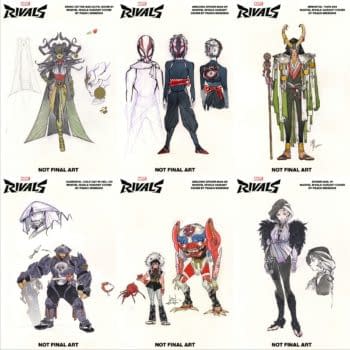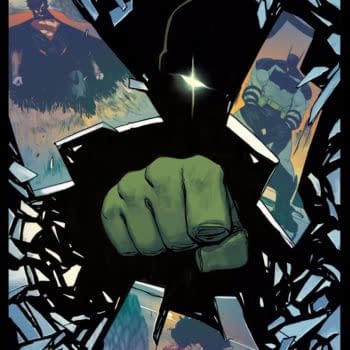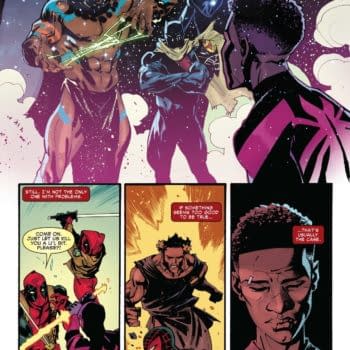Posted in: Comics, san diego comic con | Tagged:
JMS Gives The Best Advice For Writing Screen, TV And Comics At San Diego Comic-Con
Dane Styler wrote from San Diego Comic-Con for Bleeding Cool,
Screenwriter, producer, novelist, and comics writer J. Michael Straczynskibelieves in sending the elevator back down. He believes in helping others, like he once was, who have talent but not enough information. So at San Diego Comic-Con 2017, Straczynski helmed another of his irreverent yet frank, funny yet informative Q&A panels as he solicited questions from a room full of aspiring writers.
Shall we begin?
FINISH THE GODDAMN SCRIPT
"While we are in the process of writing things, we can't be judged. But when we finish and put it out there among our friends and people who don't like us, they could say, 'You're not very good.' If you've been working on something for a long time, finish the goddamn thing and move on to the next project. The more you do and finish, the more you learn."
For comic books, don't be worried too much about the type of script format you choose; it's really what's inside the format that matters (i.e. the content).
WORKSHOPS EN LIEU OF WRITING CLASSES
"Attend workshops before taking writing classes. Classes are there to teach you how the teacher feels you should write. Workshops help you find your voice.
"Though the best way to learn how to write is to read a lot."
FROM CHARACTER TO PLOT
"When developing a story, there's two ways usually: Go from character to plot, or plot to character. I work from character to plot because I found that when going from plot to character, often you end up with characters who are service to the plot instead of their own thing."
ASK ALL THE QUESTIONS
"After you have a general idea, begin answering each next logical question, truthfully, one after another. Who is the character? What does he want? How far is he willing to go to get it? How far is someone else willing to go to stop him?"
Straczynski quoted Heinlein, saying that part of science fiction writing is solving the problem for the next five minutes. To compel readers to read further, you hook them with mystery after mystery, starting with first page and/or scene, answering some along the way as you create more mysteries. In addition, he emphasized research, research, and more research, which will lead to more ideas, and make it easier to find yours answers in the process of questioning.
"So really, your process should be: Asking the next logical question, defining your characters, and doing everything in your power to poke holes in your story. Better to figure out those holes now, than 200 pages in.
"Because if you don't find those holes now, someone else will."
DO NOT WASTE YOUR TIME WRITING TELEVISION PILOTS
"Do not put your time in writing television pilots. You are wasting your time. No one is going to buy them. I hate to say that to you, but it's the god's honest truth.
"You can write an amazing pilot but a network is going to say, 'That's great, but what have you done that makes me trust you that this concept even works?' If you haven't already been working in television as a writer, that answer is zero, and you're not going to sell anything.
"The process of television writing is you sell scripts freelance, you get hired on staff, the networks and producers get to know you, they see you can deliver on time, see that you can go the distance on structure and character arcs, you become a producer, and then, you are invited to meet with the network or studio, bounce some ideas around, and maybe then you'll write a pilot for them."
WRITE SPEC SCRIPTS FOR CURRENT SHOWS
So instead of writing pilots, Straczynski said, "Write spec scripts for shows currently on the air."
"Get them to agents. Get them into the hands of people who will buy them from you or who will at least take a meeting with you. Write spec screenplays that show how you can create your own characters, which can then sow the seeds for subsequently, maybe, writing your own pilot. Get on a show, and then follow the process."
SHOW THE SHARK FIN AT THE END OF ACT AND ISSUE BREAKS
"The best way to get out of an act break is to show the shark fin. A hint of menace somewhere. A body drops. A character revelation. There has to be a big incident certainly at the end of the first act. The second act can go a bit softer – some more character work.
"Always think about the shark fin cutting through the water."
Creatively there isn't much of a difference between screen & television writing and comic book writing. Straczynski's transition from television to comic books came with the realization that panels, essentially, are like storyboards, and issue endings are like act breaks.
DO NOT BE COMPLACENT – WORK IN DIFFERENT GENRES
When asked about the most common mistake he sees from experienced writers, Straczynski said it's complacency and the reluctance to change styles and formats.
"If you write two action screenplays and they sell, you'll get a higher payment on the second action screenplay than you will on the first. And it gets incrementally higher every time you sell. If you flip genres and do a comedy or a drama, your rates drop because you haven't show that you are valid in that genre.
"So therefor the path of least resistance is doing the same thing over and over, and after awhile, you forget how to do anything else. It becomes all you know how to do. After a certain period of time, the town gets to know all of your tricks. You're not surprising them anymore. And the moment you're not surprising them, when you become what they expect you to be, you're done.
"Write in different genres and different forms all the time. Writing a good character drama will help you make the characters in a murder mystery or an action story more interesting. Writing a good action story will you help you make the drama more valid by popping things once in awhile. Everything feeds into everything else.
BE SHINY – WORK IN DIFFERENT FORMATS AND MEDIUMS
"You should always work in multiple genres. And multiple forms.
"I'm a big believer in the three-legged stool theory. You should always have three sources of revenue as a writer, because one of them will eventually go away, and you lean back on the other two until the third one shows up.
"For every ten things you work on, maybe two or three will go through. If you only work on two or three things, one or none of them will go ahead. The more plates you're spinning and the more you keep things going in different directions, the odds of one of those things happening will be greater.
"Working with scripts teaches you dialogue, which you use in a novel, which teaches structure, which you can use in a screenplay. It's like crop rotation. Again, everything feeds into everything else.
"TV studios work with television writers all the time. Comic book publishers work with comic book writers all the time. Movie studios work with screenwriters all the time. But a TV writer going into comics is suddenly shiny. A comic writer going to movies is suddenly shiny. A screenplay writing moving into TV is suddenly shiny. You get to reinvent yourself and be shiny all the time."
A WORD OF CAUTION REGARDING SELF-PUBLISHING
"On some level you're concerned about the gatekeeper saying this is not very good. If it was a good book, you wouldn't have to worry about self-publishing. You would sell it to someone.
The studios tend to see – not always, there are exceptions – but they tend to see self-publishing as vanity publishing, because anyone can do it."
Instead of a career of self-publishing, Straczynski advises getting your work out there and finding representation as soon as you can. "The best way to get into the industry, to get your foot in the door as a writer, is to do the work. Write and put your work out there."
"The more things you write and the more people who see your work, the more likely one of them will tell an agent to represent you."
LISTEN TO THE MUSIC
When first writing comics, Straczynski's safety net was 6 panels per page, with a big panel here and there, and with a splash or two-page splash once in awhile for impact. But he began to notice after a while that there's a music to paneling.
"If you have a lot of dialogue going on, it becomes like staccato notes. Lots of little panels with each word balloon having more information. Then after that intense moment, let it air, let it breathe with two panels on the next page. Brace yourself for the next big one with four or five panels, and then bam, another big panel.
"For me it's listening to the rhythm and the music of the characters and the scenes. It's something that can't be formalize. The more you write, the more you get a sense of it."
SUBMIT TO SCREENWRITING COMPETITIONS
Speaking from his previous experience judging a screenwriting competition, Straczynski said that the majority of the competition, well, isn't much of a competition.
"Ninety-five percent of what I got in from aspiring writers was so wretched, so badly thought through, so badly written and formatted, that it was hideous." He went on to say that when he would pick up a script that was properly formatted, it was like gold: "A good script glows in the dark."
RIGHT OF FIRST REFUSAL IS A GOOD PROBLEM TO HAVE
Another attendee, who shared that he had just landed a book deal, expressed his concern that the publisher had placed a Right of First Refusal clause in his contract.
"Don't make come down there and smack you," joked Straczynski, regarding the attendee's seemingly oblivious reaction toward his own good fortune.
"Right of First Refusal doesn't mean they own it. You can write whatever you want. It just means you have to bring it to them first, and if they pass, you can bring it somewhere else. You're not being boxed in."
When the attendee began to respond with a "yeah… but" follow up, Straczynski kindly yet firmly nipped that in the bud: "Shut up and listen. I'm giving you good, f*cking advice."
LEARN FROM BAD SCRIPTS
"For the first half of my career, I learned more from bad scripts. If a script is done really well, it's hard to see how that happens. It is so transparent and so clean, that you can't pull up the hood and see how did they do that.
"With a bad script, you can see easily how they should've done things different. You learn how to make a script work by seeing the inverse of a good script."
A SCENE WITHOUT DIALOGUE REVEALS CHARACTER THROUGH ACTION
"Writing a scene without dialogue really comes down to demonstrating character through action. Dialogue can become a crutch after a while, where the characters explain the story rather than showing the story to you.
"If I'm getting too talky with the script, and it's becoming too expositional, I turn off the dialogue for awhile. Let me just write what happens. And when going back over it again, if it needs dialogue, I put it in. If it can go without it, I'll leave it out.
"Find those quiet moments that expand on the characters."
NO COVERAGE
"I don't let anyone do coverage of my stuff before sending it off.
"What you need to do as a writer is express your own point of view in a way that is valid for you. The more people who pile on saying don't do it this way, do it this way, the less it becomes you after awhile."
Without that other party providing coverage, the key to self-editing is simplicity: "The process of writing is doing less. Saying exactly what you mean to say in the simplest, straight forward terms imaginable."
FIND YOUR OWN VOICE
There is a difference between voice and style: "Style can change over time, but the voice is the important one. That's you. What you discover is that writers talk the way they write, or talk the way they write.
"Stop listening to the voices around you, and start trusting your own voice."
A CHEAT FOR WRITING ENSEMBLES
Straczynski shared a cheat he uses sometimes that works really well for writing ensembles.
"If a character is really stoic, I might write that the character is 'Clint Eastwood.' A goofy kind of a guy? That's 'Paul McCartney.' I put that in the dialogue slots – when you think of those people, a certain rhythm to their dialogue comes to mind.
"And then when you're done, use 'Search and Replace' to change the characters' names back to what they should've been. Consequently, every single voice in that ensemble is completely unique from the other ones. It works subconsciously."
WRITE FOR THE SUPPORTING CHARACTERS IN YOUR SPEC SCRIPTS
"Actors, and this may come as a shock, are people… mostly. They have egos, and they have agents, and they have contracts. And supporting actors on TV shows are always bugging the producers for stories about their characters, but the producers are there to service and serve the lead. Everyone else gets whatever is leftover after that.
"If you walk in and have a great story about the second lead or third lead, that of course makes the first two still important to the story, the producer will fall to their knees and say thank god, thank you so much. That's a great way to break down the door and get your spec script sold."
SAND AND POLISH WHAT YOU SAY UNTIL YOUR STORY IS GLASS
"Start off writing by saying everything you can say about about a subject. Then sand it down to everything you want to say about a subject. Then a third time sand it down to everything you need to say about it. So when you're done, the finish product is smooth as glass. Reading from page one, it slides down to the last page.
"The last thing I do on a script is sand down and refine the dialogue."
SHORTER TELEVISION SEASONS
Shorter seasons of television productions will continue to be a trend because of rising production costs, and because of the more likely availability of high-profile actors for smaller-count episode commitments.
WRITE EVERY DAY.
Straczynski's parting advice was to write every day, and at least two pages per day. A two page minimum, after a year, would add up to a novel and a half, or four screenplays.













